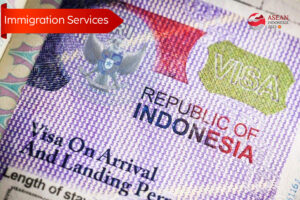In a move aimed at fostering economic cooperation, Indonesia’s Ministry of Law and Human Rights (Kemenkumham) has officially excluded Cameroon from its calling visa list. This decision is rooted in the belief that Cameroon holds economic potential and poses a low level of risk.
A Calling Visa Country, as per the regulations outlined in the Minister of Law and Human Rights of the Republic of Indonesia Regulation No. 33 of 2021 Regarding Procedures for Determining Calling Visa Countries, Application, and Visa Issuance for Citizens from Calling Visa Countries, is assessed based on various aspects such as ideology, politics, economics, social conditions, culture, defense and national security, and immigration.
The removal of Cameroon from the list is stipulated in Minister of Law and Human Rights (Kepmenkumham) Decree No. M.HH-05.GR.01.06 of 2023, ratified on November 23, 2023.
Considerations for Cameroon’s Exclusion from Indonesia’s Calling Visa List
Director-General of Immigration, Silmy Karim, emphasized, “One of the reasons for removing Cameroon from the subject list is its potential as a market and entry point for Indonesian products into West and Central African regions,” during an official statement on Tuesday (28/11/2023).
Silmy highlighted that trade data from the Central Statistics Agency (BPS) and the Ministry of Trade (Kemendag) showed a surplus in the trade balance between Indonesia and Cameroon in 2022, reaching US$32 million or approximately IDR 494.74 billion (assuming an exchange rate of IDR 15,460/US$).
Moreover, Silmy pointed out that the frequency of Administrative Immigration Actions (TAK) against Cameroonian nationals has significantly decreased in recent years. Immigration records also indicate a lack of Cameroonian nationals in Indonesia involved in legal issues or judicial processes in almost four years.
With Cameroon no longer on the country list, its citizens can no longer apply for visas through the clearing house (CH) but can submit visa applications online.
“Immigration supervision will proceed as usual, and Cameroonian nationals will face consequences for any violations. If there are repeated violations, Immigration may propose a reassessment of the calling visa revocation,” explained Silmy.
Visa Requirements for Indonesian Citizens Traveling to Cameroon
In addition to these changes, Indonesian citizens planning to visit Cameroon are now required to apply for a visa. Tourist visits will be granted visas valid for up to 30 days, while business visits will receive visas with a validity period of up to six months.
“The Directorate General of Immigration continues to evaluate countries on the calling visa list. Currently, the evaluation process for calling visa revocation is underway for Guinea in West Africa,” Silmy added.
Updated List of Calling Visa Subject Countries in Indonesia
With the removal of Cameroon, there are currently seven countries on the calling visa subject list: Afghanistan, Guinea, Israel, North Korea, Liberia, Nigeria, and Somalia. This list follows the Minister of Law and Human Rights of the Republic of Indonesia Decree No. M.HH-02.GR.01.06 of 2018, the Third Amendment to the Minister of Law and Human Rights of the Republic of Indonesia Decree No. M.HH-03.GR.01.06 of 2012 Regarding Calling Visa Countries.
The allocation of it carries profound consequences, exerting influence not only on the dynamics of bilateral relationships but also on how Indonesia is perceived globally. The strategic decision to grant calling visas serves as a tangible expression of Indonesia’s overarching foreign policy objectives, emphasizing the nation’s core values and its concerted efforts to cultivate collaborative partnerships that yield mutual advantages.
This diplomatic initiative is emblematic of Indonesia’s commitment to an inclusive and cooperative approach in its interactions with the international community. By carefully evaluating and approving this visa, Indonesia actively shapes its diplomatic narrative, showcasing a commitment to fostering positive and constructive engagements on the world stage. This nuanced and deliberate process underscores the importance placed on diplomatic ties that contribute positively to Indonesia’s image and reputation in the global arena.





 20% off today. Whatsapp us!
20% off today. Whatsapp us!